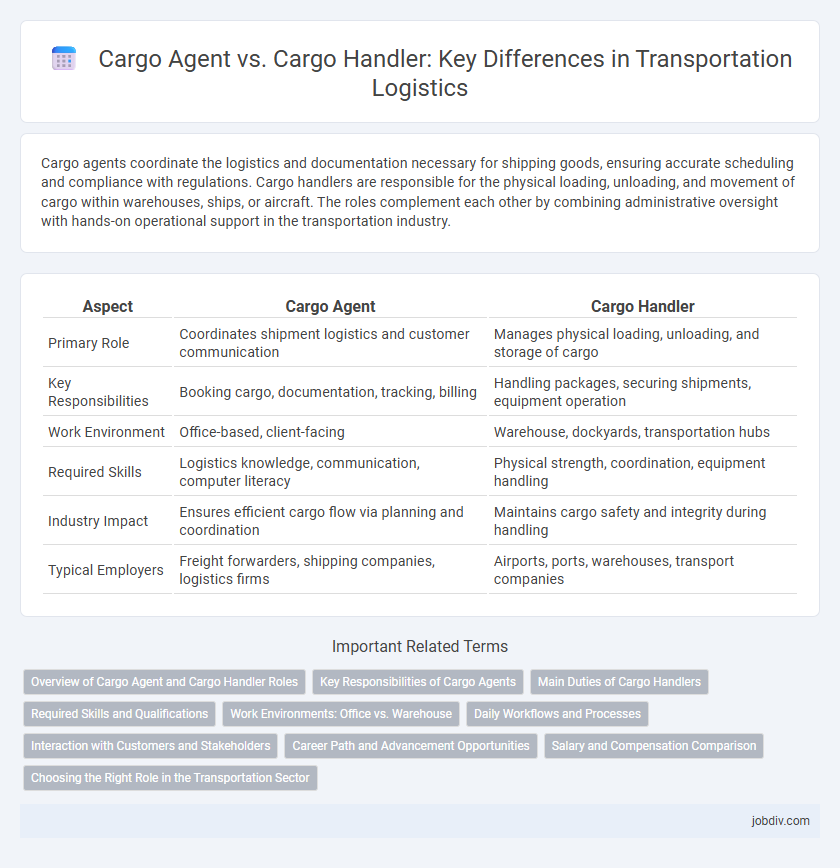Cargo agents coordinate the logistics and documentation necessary for shipping goods, ensuring accurate scheduling and compliance with regulations. Cargo handlers are responsible for the physical loading, unloading, and movement of cargo within warehouses, ships, or aircraft. The roles complement each other by combining administrative oversight with hands-on operational support in the transportation industry.
Table of Comparison
| Aspect | Cargo Agent | Cargo Handler |
|---|---|---|
| Primary Role | Coordinates shipment logistics and customer communication | Manages physical loading, unloading, and storage of cargo |
| Key Responsibilities | Booking cargo, documentation, tracking, billing | Handling packages, securing shipments, equipment operation |
| Work Environment | Office-based, client-facing | Warehouse, dockyards, transportation hubs |
| Required Skills | Logistics knowledge, communication, computer literacy | Physical strength, coordination, equipment handling |
| Industry Impact | Ensures efficient cargo flow via planning and coordination | Maintains cargo safety and integrity during handling |
| Typical Employers | Freight forwarders, shipping companies, logistics firms | Airports, ports, warehouses, transport companies |
Overview of Cargo Agent and Cargo Handler Roles
Cargo agents coordinate the shipment of goods, managing documentation, booking freight space, and liaising with carriers to ensure timely delivery. Cargo handlers physically load, unload, and secure cargo, maintaining safety standards and using equipment to move shipments efficiently within terminals or warehouses. Both roles are essential for seamless supply chain operations, with agents focusing on logistics and documentation while handlers emphasize physical cargo management.
Key Responsibilities of Cargo Agents
Cargo agents coordinate shipment logistics, ensuring accurate documentation, customs clearance, and effective communication between shippers and carriers. They handle booking cargo space, tracking consignments, and resolving issues related to freight transport. Their expertise in regulatory compliance and client relationships is crucial for smooth cargo operations.
Main Duties of Cargo Handlers
Cargo handlers primarily manage the physical movement, loading, unloading, and securing of freight in warehouses, ships, airplanes, or trucks. They ensure that cargo is properly packaged, sorted, and stored to prevent damage and facilitate efficient transport. Cargo agents focus more on documentation, coordination, and customer service, while cargo handlers are responsible for the manual labor and operational aspects of cargo handling.
Required Skills and Qualifications
Cargo agents require strong communication skills, attention to detail, and proficiency in logistics software to coordinate shipments efficiently and handle documentation accurately. Cargo handlers need physical strength, stamina, and knowledge of safety protocols to load, unload, and move cargo safely and efficiently within transportation facilities. Both roles demand teamwork, time management, and a basic understanding of transportation regulations but differ distinctly in office-based coordination versus hands-on operational tasks.
Work Environments: Office vs. Warehouse
Cargo agents primarily work in office settings where they manage shipping documentation, coordinate logistics, and communicate with clients and carriers. Cargo handlers operate in warehouse environments, physically loading, unloading, and organizing freight to ensure efficient movement of goods. The office environment demands strong administrative skills, while the warehouse requires physical stamina and hands-on handling expertise.
Daily Workflows and Processes
Cargo agents coordinate shipment documentation, manage booking schedules, and communicate with clients and freight carriers to ensure timely cargo pickup and delivery. Cargo handlers focus on the physical aspect of transportation, including loading, unloading, sorting, and securing goods at warehouses and transport hubs. Daily workflows for cargo agents involve paperwork verification and tracking, while cargo handlers prioritize efficient cargo movement and maintaining safety protocols.
Interaction with Customers and Stakeholders
Cargo agents act as the primary point of contact for customers, managing bookings, documentation, and tracking shipments to ensure clear communication and customer satisfaction. Cargo handlers focus on the physical loading, unloading, and storage of goods, working closely with logistics teams and warehouse staff to maintain shipment integrity. Both roles require effective coordination with carriers, customs officials, and supply chain partners to facilitate smooth transportation processes.
Career Path and Advancement Opportunities
Cargo agents typically manage customer relations, coordinate shipments, and handle documentation, offering pathways to roles in logistics management and supply chain coordination. Cargo handlers engage in loading, unloading, and sorting freight, providing a foundation for advancement into supervisory or warehouse management positions. Both careers benefit from industry certifications and experience, which enhance prospects for promotion and specialization within transportation sectors.
Salary and Compensation Comparison
Cargo agents typically earn a median annual salary of $45,000, reflecting their responsibilities in booking and coordinating shipments, whereas cargo handlers average around $38,000 due to the physically demanding nature of loading and unloading goods. Compensation packages for cargo agents often include performance bonuses and opportunities for commission, enhancing total earnings beyond base pay. In contrast, cargo handlers primarily receive hourly wages with overtime pay and limited bonuses, making overall compensation less variable but stable.
Choosing the Right Role in the Transportation Sector
Choosing the right role in the transportation sector depends on your strengths and interests: cargo agents specialize in logistics, customer coordination, and documentation to ensure smooth shipments, while cargo handlers focus on the physical loading, unloading, and securing of freight. Understanding the distinct responsibilities, such as agents managing shipment tracking and regulatory compliance versus handlers operating equipment and maintaining cargo safety, is crucial for aligning your career path with operational demands. Both roles are vital for efficient supply chain management, but your decision should reflect whether you prefer administrative coordination or hands-on cargo operations.
Cargo Agent vs Cargo Handler Infographic

 jobdiv.com
jobdiv.com